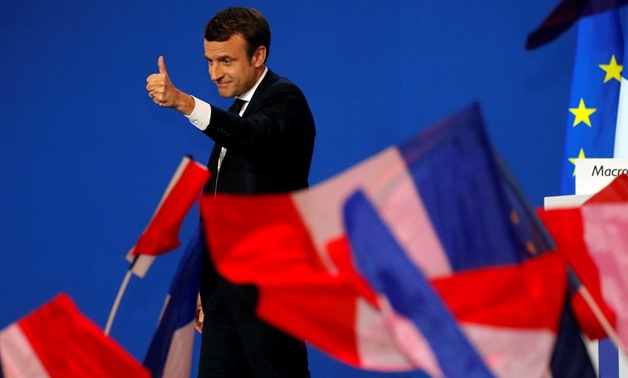
Emmanuel Macron - AFP
PARIS- 23 April: Pro-European Emmanuel Macron will face far-right candidate Marine Le Pen in the second round of France's presidential election, projections showed Sunday, making him clear favourite to emerge as the country's youngest leader in modern history.
Macron was projected to win 23-24 percent in Sunday's first round, slightly ahead of National Front (FN) leader Le Pen with 21.6-23 percent, according to estimates on public television.
They will compete in a run-off on May 7.
"The French have expressed their desire for change," Macron told AFP in a statement.
"We're clearly turning a page in French political history," said the 39-year-old, whose bid to shake up traditional politics and his marriage to his former school teacher has fascinated the country.
The outcome capped an extraordinary campaign in a deeply divided and demoralised France, which has been hit by a series of terror attacks since 2015 and remains stuck with low economic growth.
It also signalled a stunning shake-up in national politics, with no candidate from France's mainstream Socialist and Republicans parties in the second round for the first time in 60 years.
Macron, who had never before stood for election and only started his centrist movement 12 months ago, will go into the second round as the clear frontrunner.
Polls released after the first-round estimates showed the centrist, pro-business moderniser would easily beat Le Pen, who has hardened her anti-immigration and anti-Europe rhetoric over the last week.
The French vote was being closely watched as a bellwether for populist sentiment following the election of Donald Trump as US President and Britain's vote to leave the EU.
Throughout the campaign, Macron insisted that France was "contrarian" -- ready to elect a pro-globalisation liberal at a time when rightwing nationalists are making gains across the world.
"It's a victory for openness, social-mindedness and... an understanding of the modern economy that will restore French competitiveness," Macron supporter Marie-Helene Visconti, a 60-year-old artist, told AFP at his election party.
Le Pen will follow in her father Jean-Marie's footsteps who made it through to the second round in 2002. He suffered a stinging defeat when mainstream parties closed ranks to keep him out.
Reaction at her headquarters was subdued as it emerged she would not top the vote and her score would be signficantly lower than projections earlier in the year which had shown her winning around 27 percent.
She signalled her intent by saying the run-off vote would be about France's future, with her vision of the country out of the European Union and behind reinforced borders the opposite of Macron's.
"The major issue of this election is runaway globalisation, which is putting our civilisation in danger," she told supporters in her party's stronghold Henin-Beaumont in northern France.
"The French have a very simple choice. Either we continue on the path of complete deregulation, with no borders and no protection... mass immigration and free movement of terrorists... or you chose France," she added.
Far-right expert Nonna Mayer at Sciences Po university said a Le Pen victory was not impossible, "but it seems unlikely that she will carry the second round."
"If she wins, it will obviously be an anti-Europe, protectionist, exclusionist line that wins and which could have troubling consequences for Europe and France," she added.
There were already signs that Macron, whose wife Brigitte is 25 years older than him, would enjoy support from his defeated rivals in the Republicans and Socialist parties.
Socialist candidate Benoit Hamon, forecast to win a humiliating six percent and finish in fifth place, said the left had suffered a "historic drubbing" but he urged voters to keep out Le Pen who he said was "an enemy of the republic".
Scandal-hit Republicans candidate Francois Fillon followed suit, saying "there is no other choice than voting against the extreme-right. I will vote for Emmanuel Macron."
Fillon was seen as a favourite until January when his campaign was torpedoed by allegations that he gave his British-born wife a fictitious job as his parliamentary assistant for which she was paid nearly 700,000 euros ($750,000).
The former prime minister has accused President Francois Hollande of being behind a campaign to destabilise him and said the obstacles he had faced were "too numerous, too cruel".
Hollande, who decided not to seek re-election in the face of disastrous approval ratings, called Macron to congratulate him.
The vote took place under heavy security after the killing on Thursday of a policeman on Paris's Champs Elysees avenue claimed by the Islamic State group.
With France still under the state of emergency imposed after the Paris attacks of November 2015, around 50,000 police and 7,000 soldiers were deployed to guard voters.
Thursday's shooting on the most famous street in Paris was the latest in a bloody series of terror attacks that have cost more than 230 lives since 2015.
Nearly 47 million people were eligible to vote in the eurozone's second biggest economy and turnout was forecast to be high at around 80 percent on a bright spring day.
Le Pen faces several investigations over campaign financing and the use of expenses at the European parliament where she has a seat.
"I think like everyone, I've found it a terrible campaign," 79-year-old Marie Mourait told AFP in southwest Paris as she headed to church after voting.
The results will be seen as a credit to French pollsters, however, who successfully forecast the results.
They consistently showed Macron and Le Pen as the frontrunners, followed by Fillon, far-left firebrand Jean-Luc Melenchon and Hamon.
Support for Melenchon surged in recent weeks on the back of assured performances in two televised debates, briefly raising the spectre of a final round in which the anti-EU Communist-backed candidate would face off against Le Pen.
He was on course for around 19-20 percent of the vote, underlining the strength of anti-establishment sentiment in France.

Comments
Leave a Comment